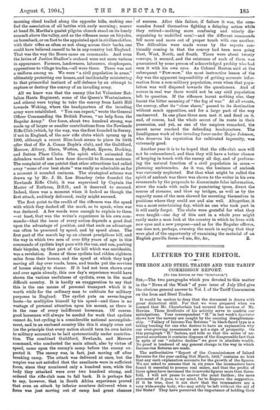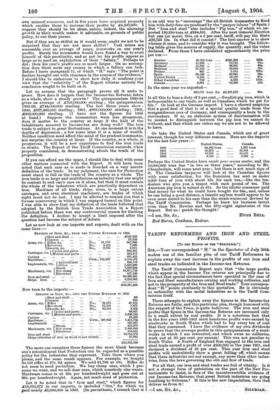THE IRON AND STEEL TRADES AND THE TARIFF COMMISSION REPORT.
(TO THE EDITOR OF THE "SPECTATOR."]
SIE,—The two paragraphs which you devoted to this matter
It would be useless to deny that the document is drawn with great dialectical skill. For that we were prepared when we learned that Mr. Chamberlain had secured the services of Mr. Hewins. These firstfruits of his activity serve to confirm our anticipations. Your correspondent " H." in last week's Spectator shows how the unwary are caught by the cunning draughtsman- ship. " Fallacy of Income-Tax Returns " in black-faced type is a taking heading for one who desires to have an explanation why our ever-growing assessments are not a sign of prosperity. On this paragraph " H." fastens, and tells us that the series of un- proved assertions it contains disposes of the disagreeable fact that in spite of our "relative decline" we grow in absolute wealth. No proof is tendered of any general change in the way in which Income-tax Returns are made.
The authoritative "Report of the Commissioners of Inland Revenue for the year ending 31st March, 1903," contains no hint that any such explanation accounts for the growth of the figures. We are asked to assume that in six years the ironmasters have found it essential to possess coal mines, and that the profits of these /pines have increased the ironworks figures more than three- fold. I will not pause to answer the point further; the mere statement of it goes, to my mind, far to disprove the suggestion. If it be true, does it not show that the ironmasters are a very wide-awake body, who may safely be left without the aid of the State? They have perceived the importance of holding their own mineral resources, and in five years have acquired property which enables them to increase their profits by 44,500,000. I suggest they should be let alone, unless, indeed, the alarming growth in their wealth makes it advisable, on grounds of public policy, to cut their purses.
But if they are as skilful as it would seem, ought we not to be surprised that they are not more skilful ? Coal mines are assessable over an average of years, ironworks on one year's profits. Surely the ironmaster would have found a way to avail himself of this peculiarity, and so not let his profits appear so large as to need an explanation of their " fallacy." Perhaps he did; then his year's profits are so much larger. On no assump- tion does there seem any cranny in which a fallacy can lurk. Before I leave paragraph 71, of which "H." says : " The point is further brought out with clearness in the course of the evidence," I should like to endeavour to show how fully it confirms your view that the " relativity " of the Report vitiates entirely the conclusion sought to be built on it.
Let us assume that the paragraph proves all it seeks to prove. How does it happen that the Income-tax Returns, taken as'a whole, show a steady growth? The quinquennium 1890-94 gives an average of 2703,000,000 sterling ; the quinquennium 1895-99, 2744,000,000 sterling. The last three years show : 1900, 2827,000,000 sterling ; 1901, 2868,000,000 sterling ; 1902, 2902,000,000 sterling. (I have not the figures for 1903 at hand.) Suppose the ironmasters were less prosperous, does it matter to the country at large if the bulk of the inhabitants assessed to Income-tax are doing well? The iron trade is subject to great fluctuations. At one moment it is in the depths of depression ; a few years later it is a mine of wealth. Neither condition need affect the mind of the prudent ironmaster, nor surprise the country at large. If the country, as a whole, is prosperous, it will be a new experience to find the iron trade in straits. The Report of the Tariff Commission succeeds, when properly considered, in demonstrating afresh the truth of the proposition.
If you can afford me the space, I should like to deal with some other matters connected with the Report. It will have been noted that such case as is made is founded on a very narrow definition of the trade. In my judgment, the case for Protection must stand or fall on the trade of the country as a whole. The iron trade is so large and multifarious an industry that one might be content to rest one's case on it alone, but then it must contain the whole of the industries which are practically dependent on iron. Machines of all kinds, ships, arms, to a large extent carriages, and even electrical machinery, are trades of which sight must not be lost. I may be allowed to remind you that a former controversy in which I was engaged turned on this point. I was ably to show that my definition of the trade followed that adopted by the British Iron Trade Association in a Report published before there was any controversial reason for limiting the definition. I decline to accept a limit imposed after the question had become the subject of debate.
Let us now look at our imports and exports, dealt with on the same lines :-
EXPORTS OP IRON, &C., PROM THE UNITED KINGDOM IN 1903.
Shot and shell ...
••• ••• •••
£145,625
76,356 • Arms, viz. Rifles, dc.
...91,796 267,940
Revolvers . . No., 4,324 7,089
Swords. kc ... No., 9,761 6,921
f Cycles and parts ...
849,281
Carriages, Motors and parts ...
343,817
685,422
Cwt9., 332,266
1,504.572
Hardware-.
Air
Implements, viz. Agricultural {Other ...
••• ••• •.•
466,108 1,233,900
Steam
5,249,294
Machinery, viz. Not steam ...
14,371,726 Electrical
437,186
Iron and steel ...
30,399,261
Ships. Iron ...
4,252,902
£60,387,400
Now turn to the imports :-
IN 1903.
R9 898 47,652 7,677 3,436 99,027 1,988,553 35,463 1,415,735 596,081 428,878 3,466,849 554,643 13,550,272 57,985 £22,253,158
The more one examines these figures the more blank becomes one's astonishment that Protection'can be regarded as a possible policy for the industries they represent. Take them where you please, and the same result appears. For example, we bought 34,533 rifles at 27s. 6d. apiece. We sold 91,796 at 58s. Rifles do not seem to need protection. We buy cheap ones, which I pre- IMMO we want, and we Bell dear ones, which somebody else wants. -Hardware comes in at 59s. per hundredweight and goes out at 96s. per hundredweight. Again, not much need of protection.
Let it be noted that in " Iron and steel," which figures for 213,550,272 in our imports, is included "Ore," for which we ,paid nearly 25,000,000 in 1903. (In parenthesis, I remark that it
IMPORTS OP IRON, &C., INTO THE UNITED KINGDOM Shot and shell ...
• •• ••• •••
Arms, viz. Rifles
Revolvers ... Swords, de.
Carriages. viz.ZOI:reS aDandapOXIS
Implements steam Machinery, viz. {Not steam Electrical_
No.. -34,5ii No., 12,166 No., 52,241
oWts..487,943
Ships (whether of iron or wood is not stated)... ...
is an odd way to "encourage" the all-British ironmaster to flood him with duty-free ore produced by the " pauper labour" of Spain-) But "Iron and steel" also includes " Pig iron," of which we im- ported 130,280 tons at 2534,501. After the next General Election but one (or more) this, on a.6 per cent. tariff, will pay the State 226,725 10s. In what did it consist ? The best answer is to show whence it came, and to consider why it was brought. The follow- ing table gives the sources of supply, the quantity, and the value declared. From these I have calculated approximately the price per ton :-
Sweden 48,383 tons
£241,904 1005.
Germany 15,568 „
70,792 915.
Holland 11,793 ,,
38,833 66s.
Belgium 17,110 „
59,054 703.
Prance 455 „
5,014 220s.
Spain 28,146 „
86,961 698.
nited States 4,166 „
18,187
875.
Other Countries 719 „
4,026 112s.
Canada 3,981 ,,
10,430 52s.
In the same year we exported-
920,773 tons for £2,937,072 64s.
Is all this to bear a duty of 5 per cent.,-Swedish pig iron, which is indispensable to our trade, as well as Canadian, which we get for 52s. ? Or look at the German import. I have a shrewd suspicion that a good deal of that is of a special quality made from the manganiferous ores of Germany, and consequently a boon to the steelmakers. If so, an elaborate system of discrimination will be needed to distinguish between the pig iron we cannot do without, and that which our rulers say we are not to be allowed to have.
Or take the United States and Canada, which are of great interest, though for very different reasons. Here are the imports for the last four years:- Perhaps the United States have mule pour mieuz sauter, and the 10,000,000 tons due " in two or three years," according to Mr. Chamberlain, will come next year ; but there is not much sign of it. The Canadian taxpayer will look at the Canadian figures with some satisfaction, for the Dominion has sent us under 4,000 tons of iron with about 12s. for each ton,-like the tea- dealers who give you a teapot with each pound of tea. The American pig iron is valued at 87s. So the idiotic consumer paid that money for what he could have bought for 64e., and, unless he can bring a good defence, a lunatic asylum would appear to be even more suited to his case than the strait-waistcoat devised by the Tariff Commission. Perhaps he knew his business better even than Mr. Ilewins and the fifty-eight signatories of the Report. But no ! perish the thought !
-I am, Sir, &c., HUGH BELL.
1900 1901 1902 1903 United States. Canada.
94,282 tons 1,887 'bona 35,272 „ 52,161 „ 10,701 „ 51,041 „







































 Previous page
Previous page